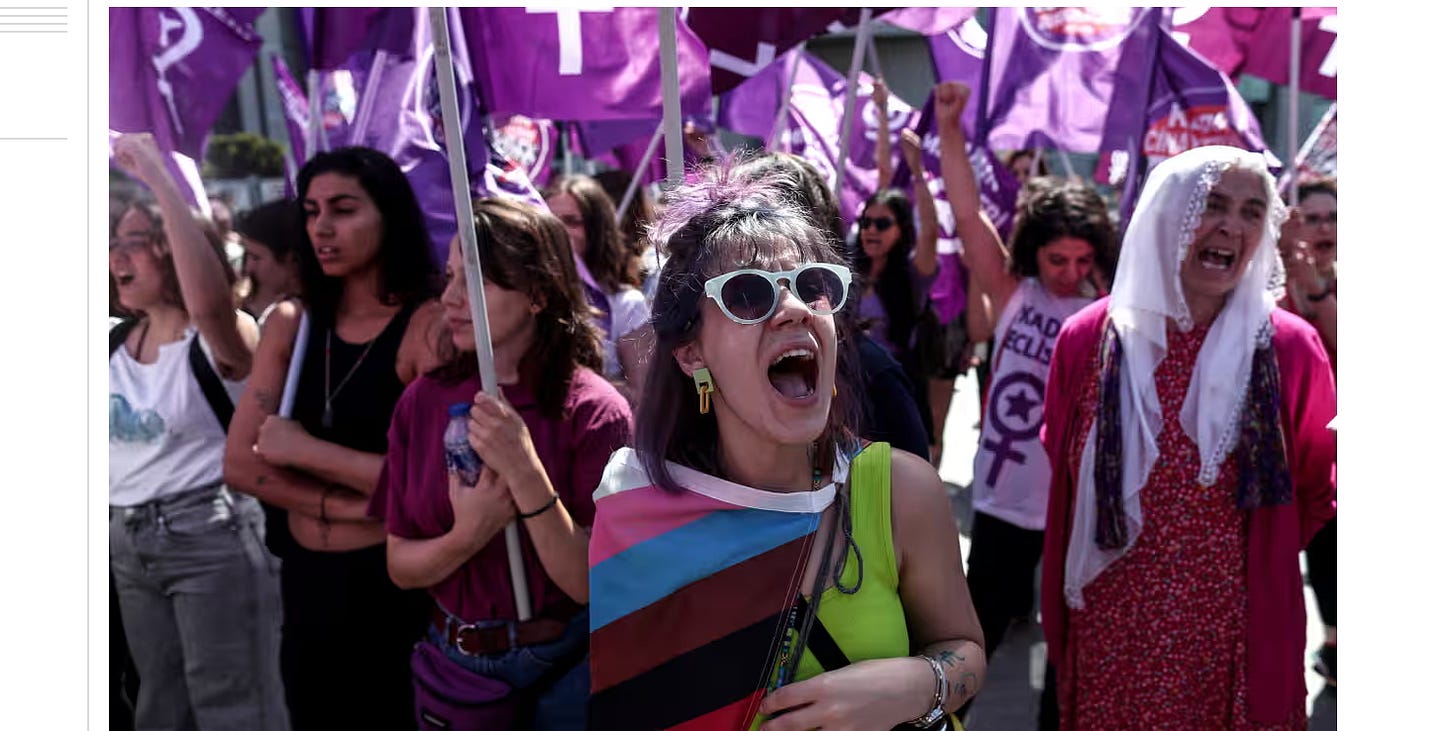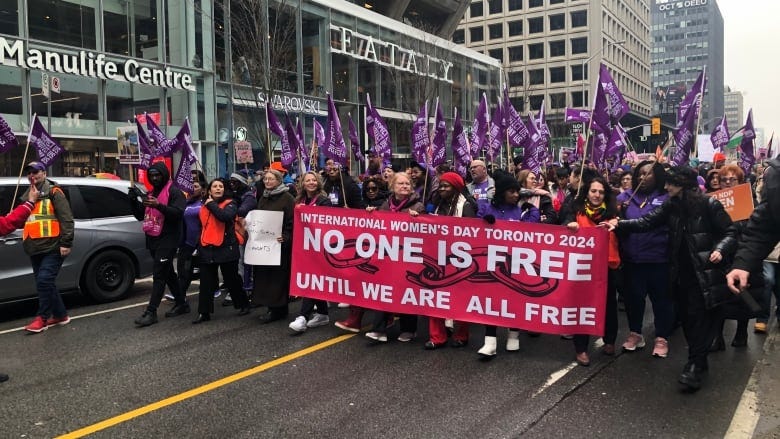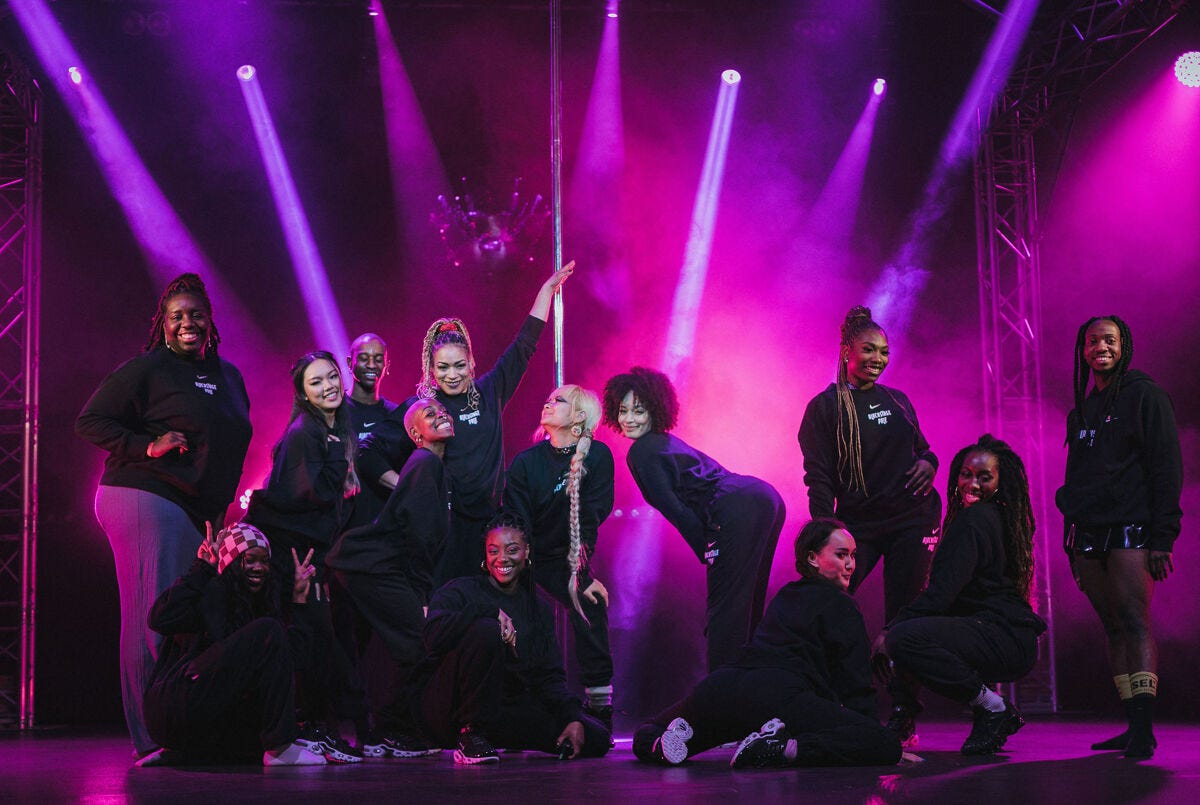Global Roundup: Turkey Femicides, Canada Women’s March, Afghanistan Activist Memoir, Black Disabled Artist & Activist, Black Queer Pole Dancers
Curated by FG Contributor Samiha Hossain
CW: gender-based violence
Supporters of We Will Stop Femicide protest at the Turkish prosecutor’s attempt to close the group over alleged ‘immoral activities’ in June 2022. Photograph: Sedat Suna/EPA
The women were aged between 32 and 49. At least three of the assailants took their own lives, two were arrested and one who was wounded while being detained later died. The fate of the seventh, who had escaped prison to kill his wife, remains unclear.
In 2023, the women’s rights NGO We Will Stop Femicide recorded 315 murders of women, 65% of whom were killed in their own homes. An additional 248 cases of “suspicious deaths”, described as “suicide” by authorities, have been attributed to a third party by feminist groups, which note the rise of defenestration incidents in Turkey.
The rise of femicide follows the country’s 2021 withdrawal from the Istanbul Convention, the Council of Europe convention on preventing and combating violence against women and domestic violence which requires authorities to investigate and punish violence against women. In addition, a lawsuit filed against We Will Stop Femicide by the Istanbul prosecutor in 2022 over alleged “immoral activities” was dropped last September.
In 15 years, the only year when the number of femicides decreased was in 2011, the year which the Istanbul Convention was adopted. -We Will Stop Femicide
Hundreds marched in downtown Toronto on Saturday to mark International Women's Day. (Clara Pasieka/CBC)
Hundreds of women and supporters took to the streets of Toronto, Canada on Saturday to celebrate women's achievements and demand equal rights for women across the globe. For this year's International Women's Day, organizers touted the theme "No one is free until we are all free" to highlight the discrepancy in women's rights when it comes to wages, education and safety around the world.
In downtown Toronto, community leaders, labour groups and supporters gathered, danced and chanted during a rally and march. A Ward Councillor, Ausma Malik, said it's important for politicians to observe the day and act on the issues being raised.
Our fates are tied when we do improve wages, when we do improve access to public services, when we do invest in housing and child care as a city and as a country. It's not just women, it's communities, it's families, it's whole cities that do better. -Ausma Malik
Women like Gail Fernando were thinking about women in places like Gaza, where women and children accounted for about 70 per cent of the reported death toll in 2023, according to the Gaza Health Ministry's figures. Protestor Siram Tortumlu said it's important to protest for women's rights and for Palestinian women at the same time. Women in Gaza don't have access to safe and stable medical care — particularly before, during and after giving birth — and also don't have regular access to menstruation products, she said.
Women and girls are forgotten. So we're really out here trying to bring light to the unique struggles that they have. - Siram Tortumlu
Susan Gapka, a community and trans activist, said it's important for Canadians to safeguard the strides in LGBTQ+ rights that have been made in this country, particularly as a "global phenomena" of rising hatred against LGBTQ+ people all over the world threatens to undo progress. She points to laws targeting trans people and LGBTQ people in the Canadian provinces: Alberta, New Brunswick and Saskatchewan, and also nodded to south of the border, where several states are passing "anti-trans" laws and restricting women's bodily autonomy when it comes to access to abortion and contraception.
As a trans elder I can see how far we've come. When I was a youngster, homosexuality was criminalized. We had achieved these successes. We need to be united — trans women, racialized women, Indigenous women in the struggle, because they're gonna come for all of us eventually. -Susan Gapka
When the Taliban returned to power in Afghanistan in 2021, education activist Pashtana Durrani, then 24, had some 7,000 girls enrolled in her organization, “Learn Afghanistan.” The schools were shuttered and Durrani was forced to flee. She’s now living in exile in the U.S. and still working to educate girls in secret back home. Durrani spoke to PBS about her remarkable story told in her new book, "Last to Eat, Last to Learn."
Durrani says the title of her book is a reflection of how the first daughters are always the last ones to eat because they have to do all the chores and take care of everyone first. For the same reasons, they are also the last ones chosen to learn. She says the book is a dedication to all these girls – especially young girls.
Durrani discusses how she was raised in a privileged way and did not have the traditional restrictions because her father raised her like a son. She spent most of her life growing up in a refugee camp in Pakistan but returned to Afghanistan to start her organization.
Now, Durrani has to teach girls in Afghanistan from the U.S. She says more than 300 girls go to school everyday and more than 30 teachers teach in-person. She also expresses worry for the safety of the 40 people she has employed in Afghanistan.
Durrani’s goal is by the end of 2030, her organization will have more than 3400 young girl leaders, who can lead a movement to rebuild Afghanistan. Her goals for herself are to graduate from her Master’s degree at Harvard and build 34 schools by the end of 2025.
Photo: Seth Harrison/USA Today
Lachi is a singer-songwriter based in New York who is blind. She offers a visual self-description for blind people in her audience, saying she is a Black woman whose hair is in cornrows. She describes her outfit, her jewelry, her nails, her shoes. She tells them she identifies as blind. (Her book, "I Identify As Blind," is due in 2025.) She tells them she's a community builder, co-founder and president of RAMPD ( Recording Artists and Music Professionals with Disabilities).
She has a vision for the future, but the artist — who goes by a single name, adapted from the language of her parents’ Nigerian homeland — will never see better than she does today. A condition called coloboma is progressively sapping her sight. Lachi speaks to Lohud about her life and advocacy.
Lachi discusses “inspiration porn” – narratives when people describe disabled people as “brave” or “courageous.” She is also not a fan of the expression “differently abled” as she says it is patronizing and shows how people are afraid to talk about disability. Lachi also talks about her signature accessory, her “glam cane.”
One of the reasons that I glam out my canes and really am loud and proud about it is because I should have been using a cane since I was a kid, and I didn't want to because I didn't want the stigma. I didn't have any role models…I want to use my cane. I want to use it proudly. But, you know, not all canes match all glorious dresses on red carpets. I've gotta have a cane that's part of my personality. And I believe that fashion is an expression of self and if I'm going to express myself through my fashion and what I wear, I want my cane to reflect who I am, as well. -Lachi
One of Lachi’s proudest moments was the first time she was public about her blindness at a Grammys virtual panel in 2021. People then began to ask her if she would be the one to start a movement, which led to the creation of RAMPD. Lachi sees it as a community where people can share their experiences. She says that she views her disability as part of her identity in the same way her Blackness and womanhood are.
Photo: Provided by Blackstage Pole
Black people created pole dance, and now activists are fighting to end the whitewashing and queer erasure taking place in the industry. Blackstage Pole’s Instagram page is a collection of reels teasing the upcoming pole dance performances that will take place at its annual show in London, UK. On April 6, 13 professionals from around the world will take the stage, symbolizing the diversity that the group’s founder, Leila Davis, wishes could be present across the entire pole industry. Davis is a queer professional dancer who has been in the industry for over a decade and has performed with the likes of Snoop Dogg, Bruna Boy, and Shygirl
There is a lack of representation of BPOC folks and a hugely negative white, non-sex worker allied pole narrative, which also erases trans, plus-sized and non-binary polers. -Leila Davis
Some documentation indicates that pole dance evolved from a 2000-year-old Chinese sport, while elsewhere there are references to an African fertility dance. Regardless, the dance style made its way into U.S. traveling circuses before becoming synonymous with sex workers and showgirls in the 1950s. Today, pole dance has slid into the mainstream. And as it gains more popularity, some in the community worry its origins are becoming forgotten and “whitewashed” and that it’s failing to stay true to its inclusive nature.
Destiny, a 23-year-old poll instructor, performer, and stripper from Manchester, said she initially thought the space was inclusive after joining a local pole dance class specifically for people of color. However, she said many studios have a “female-only girl power type vibe,” which can exclude anyone who isn’t a “straight-sized, cis heterosexual white woman.” That, in turn, means many competition lineups lack representation, having around one person of color or LGBTQ+ person, Destiny said. When that’s Destiny, it makes her question whether she’s there because she’s wanted or to fill a quota.
Davis founded Blackstage Pole in 2020 to center and enhance the creativity of pole dancers of color as well as those who are queer, trans, disabled, low-income, or sex workers. This year marks the first time the showcase is being supported by Arts Council England, formalizing its recognition as an art form. Out of over 200 applicants, 13, including Destiny, have been selected to debut at the event. A trans-Filipina performer, a Snoop Dogg backup dancer who uses pole as resource for survivors of sexual abuse, and an American queer sex worker have made the cut. The continuous aim, said Davis, is to highlight the true diversity of this art form.
It’s just a great place to showcase that we are here and we are in this community and we’re not going anywhere. -Destiny
Samiha Hossain (she/her) is an aspiring urban planner studying at Toronto Metropolitan University. Throughout the years, she has worked in nonprofits with survivors of sexual violence and youth. Samiha firmly believes in the power of connecting with people and listening to their stories to create solidarity and heal as a community. She loves learning about the diverse forms of feminist resistance around the world.






